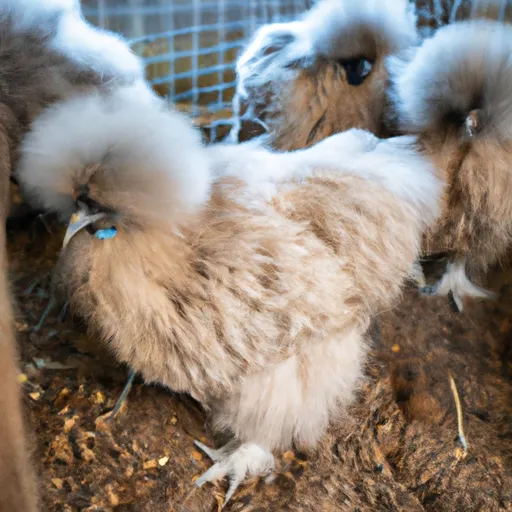Silkies 101: Everything You Need to Know About This Unique and Beloved Breed
Have you ever seen a chicken that looks like it’s wearing a fur coat?
If not, then you haven’t met the Silkie Chicken breed yet.
Silkies are one of the most unique and beloved chicken breeds in the world, and they have been captivating people for centuries with their fluffy feathers and friendly personalities.
In this article, we will explore everything you need to know about Silkie Chickens, including their history, physical characteristics, temperament, and more. Let’s get started!
Introduction to Silkie Chickens
Silkie Chickens are a small, fluffy breed of chicken that originated in China over 2,000 years ago.
They were first introduced to Europe in the late 18th century, where they quickly became popular due to their unique appearance and gentle nature.
Today, Silkies are one of the most recognized and beloved chicken breeds in the world, and they are often kept as pets or used for show.
What are Silkies Known For
There are several things that Silkie Chickens are known for, but perhaps the most notable is their fluffy plumage. Silkies have a thick layer of soft, downy feathers that cover their bodies, which gives them a distinctive look and feel.
Additionally, Silkies are known for their docile temperaments and friendliness towards humans. They are often described as “the golden retrievers of the chicken world” because of their affectionate natures.
Do Silkies Lay Good Eggs
While Silkies are primarily kept for their ornamental value, they are also decent layers of eggs. On average, Silkie hens lay around 3-4 small, cream-colored eggs per week.
While these eggs may be smaller than those laid by other breeds, they are highly prized for their rich flavor and nutritional content.
See also Why the Silkie Chicken is One of the Best Pets for Families with Children
What Makes Silkie Chickens Different
One thing that sets Silkie Chickens apart from other breeds is their lack of earlobes.
Most chickens have large, floppy earlobes on either side of their heads, but Silkies have none at all.
Instead, they have small, rounded ears that give them an adorable, owl-like appearance.
Another distinguishing feature of Silkies is their five toes, whereas most chickens only have four.
Why do People Like Silkie Chickens
People love Silkie Chickens for many reasons. Their unique appearance and gentle dispositions make them stand out among other chicken breeds, and they are incredibly easy to handle and care for.
Silkies are also great foragers and can survive well even without access to commercial feed. Plus, their small size makes them ideal for backyard flocks with limited space.
What is the Lifespan of a Silkie Chicken
The lifespan of a Silkie Chicken varies depending on factors such as genetics, environment, and diet.
However, on average, Silkies live for about 5-7 years. With proper care and attention, some Silkies can live up to 10 years or longer. I have heard of one that lived for 20 years!
Do Silkie Chickens Like to be Held
Yes, Silkies are very social birds who enjoy being held and cuddled. In fact, they are
often referred to as “lap chickens” because of how much they enjoy snuggling up against their owners.

Just be sure to support their body weight when holding them, as their fluffy feathers can make it difficult to tell exactly where their center of gravity is.
Are Silkies Noisy
Compared to other chicken breeds, Silkies are relatively quiet.
See also Raising The Right Chicken Breed - Chicken Breeds That Lay Eggs
They don’t tend to squawk or cluck loudly unless provoked or threatened, making them ideal for urban or suburban settings where noise pollution is a concern.
What is the Best Feed for Silkies
Like all chickens, Silkies require a balanced diet consisting of grains, seeds, vegetables, and protein sources such as insects and worms.
A high-quality chicken feed formulated specifically for laying hens is usually sufficient for Silkies, although some people prefer to supplement their diets with additional treats like mealworms or cooked eggshells.
What Chickens Get Along with Silkies
Silkies are generally compatible with most other chicken breeds, although they may be bullied by larger or more aggressive birds.
It’s best to introduce Silkies to your existing flock slowly and monitor their behavior closely to ensure everyone gets along.
Benefits of Owning a Silkie Chicken
There are many benefits to owning a Silkie Chicken. As mentioned earlier, they are incredibly friendly and social animals who thrive on human interaction.
They are also excellent foragers and can help keep your yard free of bugs and pests. Additionally, their small size and calm demeanors make them perfect for families with children or those living in tight quarters.
Finally, their delicious eggs and meat are a bonus for anyone looking to raise their own food.
Can Silkies Get Wet
While Silkies are known for their fluffy feathers, they actually hold up surprisingly well in wet weather.
Their downy coats provide insulation against moisture, and their small size helps them stay dry faster than larger breeds.
That said, it’s still important to provide shelter and protection from extreme weather conditions, whether it’s rain or heat.
